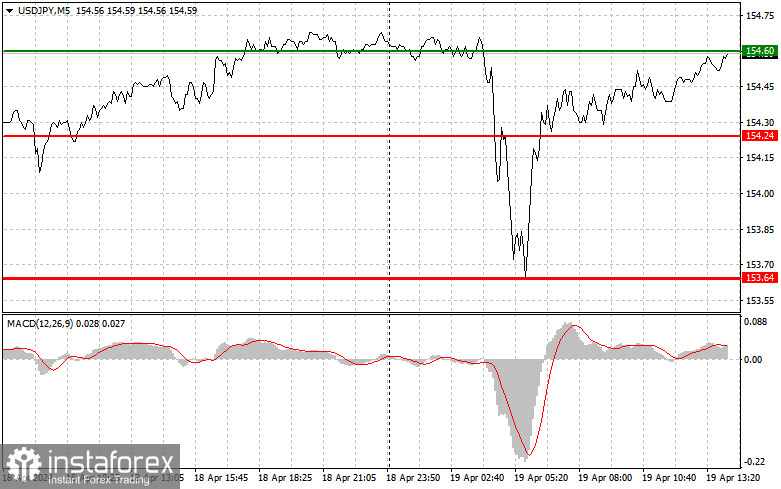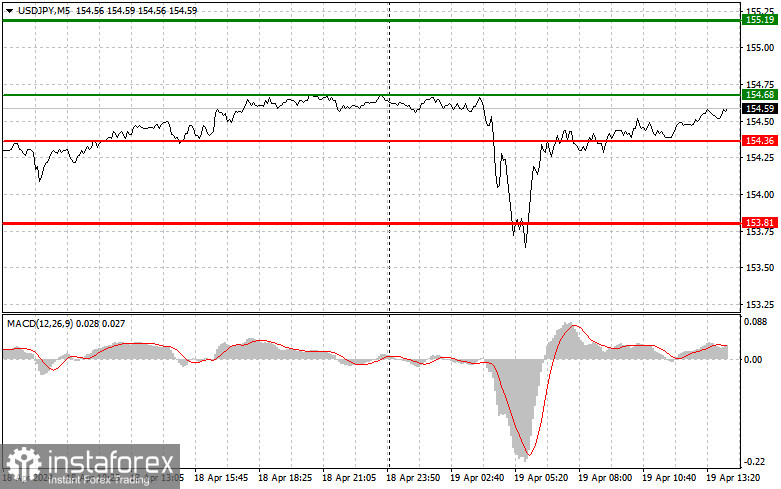Deal Analysis and Trading Tips for the Japanese Yen
No tests of the levels I indicated in the first half of the day prevented entry into the market. Yes, the dollar reacted with a decline to news of reduced pricing pressure in Japan. Still, buyers quickly absorbed all downward movement and again stalled around the weekly high, as if wary of actions by the Bank of Japan, which are unlikely to be expected by the end of the week. Since there are no statistics in the second half of the day, nor are there any planned speeches by Federal Reserve representatives, trading will continue in a low volatility and volume channel. As for the intraday strategy, I will rely more on scenarios #1 and #2.

Buy Signal
Scenario #1: I plan to buy USD/JPY today when it reaches the entry point around 154.68 (green line on the chart), with a target of rising to 155.19 (thicker green line). I will exit purchases around 155.19 and open sales in the opposite direction (anticipating a 30-35 point move in the opposite direction from the level). Counting on the pair's rise today is unlikely to materialize. Important! Before buying, ensure the MACD indicator is above the zero mark and just starting to rise from it.
Scenario #2: I also plan to buy USD/JPY today in case of two consecutive tests of the price at 154.36 when the MACD indicator is in oversold territory. This will limit the downside potential of the pair and lead to a reversal of the upward market. Expect a rise to the opposite levels of 154.68 and 155.19.
Sell Signal
Scenario #1: I plan to sell USD/JPY today after updating the level of 154.36 (red line on the chart), leading to a rapid decline in the pair. The key target for sellers will be the level of 153.81, where I will exit sales and immediately open purchases in the opposite direction (anticipating a 20-25 point move in the opposite direction from the level). Pressure on the pair will return in case of an unsuccessful breakthrough of the daily maximum. Important! Before selling, make sure that the MACD indicator is below the zero mark and just starting to decline.
Scenario #2: I also plan to sell USD/JPY today in case of two consecutive tests of the price at 154.68 when the MACD indicator is in overbought territory. This will limit the upward potential of the pair and lead to a downward market reversal. Expect a decline to the opposite levels of 154.36 and 153.81.

What's on the chart:
Thin green line - entry price, at which you can buy the trading instrument;
Thick green line - the assumed price where you can set Take Profit or fix profits yourself, as further growth above this level is unlikely;
Thin red line - entry price, at which you can sell the trading instrument;
Thick red line - the assumed price where you can set Take Profit or fix profits yourself, as further decline below this level is unlikely;
MACD indicator. When entering the market, following overbought and oversold zones is important.
Important. Beginner traders in the Forex market need to be very cautious when deciding to enter the market. It's best to stay out of the market before important fundamental reports are released to avoid getting caught in sharp exchange rate fluctuations. If you decide to trade during news releases, always place stop orders to minimize losses. You need to set stop orders to lose your entire deposit quickly, especially if you do not use money management and trade with large volumes.
And remember, successful trading requires a clear trading plan, such as the one presented above. Spontaneous decision-making based on the current market situation is inherently a losing strategy for an intraday trader.





















